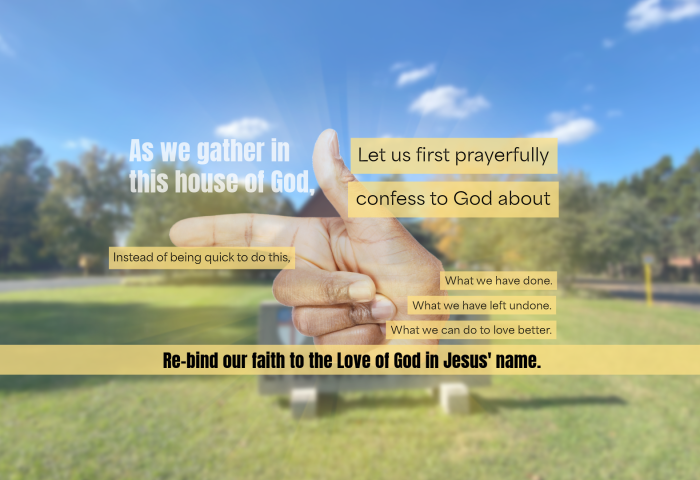
Beloved,
I don’t know about you, but I have tried many things to overcome bad habits to meet a new and better “me.” By trying, I mean an eternal quest to find “the right” self-help organizing products, inspirational quotes, and revolutionary so-called life hacks to stay motivated and successfully change. Despite countless efforts, I almost always arrive at the illusion of competence that “feels like” a new and exciting me for a while, but it can’t be further from the truth. It’s still the same old stubborn me that seeks changes in everything else but “myself.” I deny my deep thirst for external validation of the effort, mistaking such denial for humble self-denial. Then I cry to God, “Why am I not getting the desired result after everything I’ve done!?” I try rationalizing my feelings and actions—or lack thereof—to validate my pitiful self-righteousness and blame the world.
We all resent admitting such inner neediness. However, we will never get to the truth unless we first own our self-pitied neediness for God’s validation, to which we feel entitled. Anytime we ignore, avoid, hide, or deny it to project self-confidence, we successfully falsify shallow peace with exaggerated toxic positivity covered in a cringe-worthy, painfully curated camera-ready smile, as seen in many influencers on social media. Jesus never taught his disciples to pretend to love one another this way to solicit more views, likes, and followers.
I began writing this letter shortly after the assassination attempt of former President Trump. It has been a little over a week since the attempt. Being only a few months away from the November election, we all are experiencing suppressed tension, wearing feelings on our sleeve, spewing outrage, and finger-pointing regardless of our political leanings—to blame the government and politics, if not then the media, big corporations, and churches, if not then criminals, strangers or even loved ones! We become quick to point out one thing after another to nitpick around us, lecturing what they ought to do, but rarely think of what we can or must do to change ourselves. We do anything to defend and protect our unexamined self-righteousness, foolishly assuming we are defending something bigger. We rationalize our fear and try to validate ourselves so that changes won’t involve us but whomever else. While we may want to separate ourselves and scapegoat the shooter, the firearm, the Secret Service, or anything else, in reality, we all have hostility just waiting to snap at the right moment. Unfortunately, denying it will not make it go away.
As we’ve all read many times, Jesus commands us to love God and our neighbor as he has loved us. Apostle Paul describes love in his first letter to the Corinthians like this.
Love is patient and kind; love does not envy or boast; it is not arrogant or rude. It does not insist on its own way; it is not irritable or resentful; it does not rejoice at wrongdoing, but rejoices with the truth. Love bears all things, believes all things, hopes all things, endures all things.
Such love starts with listening with humility to our inner voice that is raw, uncomfortable, emotional, often illogical, and even hurtful – our true self with all kinds of flaws. Even then, Jesus forgave us to show God’s love in ways most unimaginable. We might learn to be more compassionate toward others when we come to terms with our vulnerable selves and realize God’s Grace and Mercy to love us in spite of our brokenness. In other words, we all are a stinky bunch so full of ourselves, no different than anyone else to whom we point fingers. We can always try to love harder.
Brave and non-defensive confession of our flaws is the beginning of practicing Christ-like love because it forces us to listen, acknowledge, and repent our sins, through which God shows us how to love better. Love transforms us and leads us to the truth. After all, the word religion [religare in Latin] means re-binding. Through countless confessions and repentance, we re-bind ourselves to mend relationships with our inner shame, with others, and ultimately with God; Love must be the re-binding agent to glue us together, not hatred.
Disagreement and disrespect are not the same. Furthermore, one’s disrespect is not permission for retribution. We must always choose to walk in love as Christ loved us. Love must be the root of our deliberate act as we pledge to follow Jesus Christ. We can do better. We should do better. I am excited to begin another round of the Walk in Love series on Sunday Mornings starting in August.
I look forward to spending time with you.
Lastly, I will end my letter with an excerpt from a famous Kentucky writer, Wendell Berry.
We have lived our lives by the assumption that what was good for us would be good for the world. We have been wrong. We must change our lives so that it will be possible to live by the contrary assumption, that what is good for the world will be good for us. And that requires that we make the effort to know the world and learn what is good for it.
With Love,
Fr. Andrew
